- Home
- Darcy Pattison
Sleepers Page 10
Sleepers Read online
Page 10
“Do you think I could take it home with me? Would it like the waters of my world?” Jake reached out a hand, hoping to stroke the seal, but abruptly, it dove. Jake watched the dark waters, waiting for it to come up.
Suddenly, from the corner of his eye, Jake saw a kayak paddle flash around and strike Dad’s head.
Dad recoiled, and his kayak rocked and flipped upside down. The blue bottom was strangely still.
Shocked, Jake whirled to see someone in a red kayak, but the kayak paddle was now swinging his way. He back-paddled forcefully, frantically wondering if Dad was okay.
He was a powerful enough paddler that within a couple strokes, he was out of range of—it was a woman. Was she crazy?
“Dad!” he called.
And on cue, Dad flipped his kayak upright, blowing and blubbering and gasping for air.
The woman glared from one to the other, “I’ll have no poachers on my watch.”
“Oh,” Jake groaned. She’d heard his last comment and thought he was there to kidnap a seal for some private location or zoo. “You misunderstood.”
“I know what I heard. You want one of my seals for your ‘world.’” She made air-quotes with her hands.
Dad wiped streaming water from his face and said, “It was hypothetical! I grew up on Bainbridge, and I know better than to harass the seals.”
For a long moment, they stared at each other.
The woman took a deep breath, sighed and said, “I’m sorry. It’s just that—”
Dad nodded. “You’re passionate about protecting the environment. I get it. No harm done.” He rubbed the side of his head and added, “But it’s a good thing I knew how to right my kayak or you’d have murder on your conscience.”
“My name’s Bobbie Fleming. I’m a marine biologist for Washington State, and it’s my job to monitor the harbor seals, to make sure no one bothers them.” Under a red baseball cap—just a generic one, not a team cap—she wore scholarly wire-rimmed glasses, apparently prescription sunglasses. In her leathery, freckled face was written the years spent in the sun and surf. “How could I know if you had guns or not? Poachers are a nasty business. I hit first and ask questions later.”
Jake squirmed at the tension between them, remembering Swann’s instructions in diplomacy: “When two people are about to fight, change the subject.”
Jake’s seal still hadn’t resurfaced. To deflect the biologist, he asked, “How much do seals weight?”
“150-180 pounds,” she said. “Lots of blubber to keep them warm.” Gloved hands expertly handled the paddle, and with a quick stroke, she was level with Jake and Dad. Her freckled face still frowned, but she’d lost the intensity of the first moments.
Jake remembered his Risonian tutors lecturing about Earthling creatures: “We Risonians have a specialized myoglobin in our blood, and on Earth, myoglobin is found in harbor seals. Ours is a more efficient molecule and has the ability to warm our bodies without bulky fur like the seal.”
Risonian kids were required to study Earth flora and fauna because some of them might actually make it to Earth to live. Jake tried not to think of his friends still on Rison, who would never see an actual harbor seal.
Fleming wagged a finger between Dad and Jake. “Father and son?”
Dad nodded and paddled closer to Jake. “Yes. I’m Navy and just here for the weekend. Jake lives with my parents, Sir and Easter Rose.”
Fleming nodded and took off her cap to wipe her brow. In the early morning sun, long blond hair gleamed down her back, and Jake thought again of the mermaid stories. She reached up to stretch, the red cap waving in one hand, and then pulled her hair back through the cap’s back and settled the brim to shade her eyes.
Jake had an idea. He nodded his chin toward Blakely Rock. “You come out here often?”
Fleming said simply, “It’s my job.”
“You ever need help? Someone to come along and—I don’t know—take samples or something? Whatever you do?” Jake held his breath, hoping she’d give him a good excuse to come out on the water often.
She held up a yellow dry bag that was clipped to her kayak. In the wetsuit, her body had a lean look to it—as if she clung to her teenage years and wouldn’t let them go. Still, he guessed she had to be mid-thirties or older. She reached into a utility belt at the waist of her wet suit and showed Jake a small notebook and pen. “Sure. I take water samples all the time. I have to record exactly when and where I took it, and then quickly get it to an ice chest so organisms can’t grow before we test it. You interested in marine biology?”
“Yes, ma’am.” That was an understatement. “I’d love to come out and help.”
Dad glared at Jake. “Do you think you can do that and keep up with your homework, too?”
“Of course,” Jake said. “Not a problem.”
He knew that Dad wouldn’t forbid him to come out with the scientist, even if he wanted to. Dad and Mom wanted him to fit in with the community, and that required Jake to interact somehow. Jake figured it might as well be on the water.
She shrugged. “It’s wet suit weather, anyway.” She nodded at Dad, who survived the dunking because of his wet suit. “Where’s your wetsuit?”
Thinking fast, Jake said, “I tried it on this morning, and I’ve outgrown it. We’ll order a new one this afternoon.”
She nodded. “Saturday mornings work for you? Early?”
Jake grinned at how well this had worked. “6 a.m.?”
Once that was agreed upon, Dad and Jake turned their kayaks back toward Eagle Harbor.
Fleming called after them, “Sorry about the head.”
Dad raised a hand in acknowledgment without looking around.
They had just finished strapping the kayaks to the car when Dad’s phone rang.
“Yes, sir.” Pause. “Yes, sir.” Pause. “Right away, sir.”
And Jake knew their visit was over.
Driving home, Dad turned on the car heater, so Jake pulled off his jacket. He wondered if Dad felt the awkwardness that had grown between them, too. The Navy would always be Dad’s master, and family would always come second.
Volcanoes
School was exhausting for Jake because he had to be on guard at all times. On Wednesday that week, Jake stood in the cafeteria and scanned the crowd with a frown. He was expected to mingle with the other students, but he still hated making small talk.
He spotted Em across the cafeteria, and she waved him over. With relief, he wound through the crowd to her table. Her hair was twisted and fastened somehow low on her neck, but Jake couldn’t see how it stayed in position. Another girl thing to ask Easter.
He plopped his tray beside Em’s and straddled the uncomfortable seat. Her friends laughed, and he suddenly realized he was the only boy at the table. She had wanted him to join her, right? Or had she just casually waved? It didn’t matter because he still needed information. In Biology, Coach Blevins had emphasized that tomorrow was the deadline to turn in permission slips for the field trip. He needed to know if it was worth worrying about. He bit into his hamburger and looked sideways at her. “What’s a field trip? Are we going to visit a field of grass or something?”
Em laughed. “You’re so funny. This’ll be the best trip of the year for freshmen.”
She hadn’t answered his question, but he realized he couldn’t repeat his question or he’d look really dumb. Instead, he changed tactics. “Why’s this one the best?”
“Volcanoes.” Em pointed out the cafeteria window toward the mountain in the distance. “Mt. Rainier is an inactive volcano, and we’ll get to walk all over it.” She held up a thermos of what Jake knew was coffee. “Want some?”
“No, thanks.” Jake had decided he didn’t like coffee’s bitter taste. After binging for a couple weeks, he had cut back on coffee. He picked up the Coke can from his tray and shook it absently. “You ever worry that the volcano might explode?”
“Nah,” she said. “It’s inactive.”
He’d studied
Earth’s volcanoes, of course, and especially how they differed from Risonian volcanoes. The biggest difference was that Rison had a fixed crust, while Earth’s crust was broken into large sections called plates. Plate tectonics, or the science of how Earth’s crusts moved around, were odd. The points where the crust plates met were often weaker and that’s where magma pushed through the surface to create volcanoes. It created the “Ring of Fire,” the volcanoes around the rim of the Pacific Ocean. Jake understood the concept, and he actually admired the scientific study required to come up with the theory. It was just creepy to walk on Earth’s crusts that were constantly in motion themselves. The crusts moved, while the Earth rotated on its axis, while it orbited the sun. Stability was an illusion.
Swann had always laughed at him for this aversion. “Rison may have a fixed crust, but Rison also rotates on its axis while orbiting Turco.”
Jake opened the soft drink with a pop. Brown foam squirted everywhere, spilling over the can’s rim and onto the table. Looking up, he saw Em laughing.
“That’s a good one,” she said. “Exploding Coke; exploding volcano.”
Jake frowned. It was good that he’d made a mess? Was she implying that he’d meant to create an exploding Coke? He searched for a napkin to wipe off his hands, but found none. Even after three years on the Moon, he understood so little of the social aspects of Earth because he’d been the only teen there. Math class or even English class—those were easy. Lunch hour left him exhausted.
He hopped up to grab napkins to mop up the mess. When he sat down to eat again, he found his hamburger bun soaked with Coke, too. He pushed the tray aside and leaned his chin on his hands to study the massive mountain out the window.
The difference between volcanoes on his home planet and Earth meant different geographies. The Hawaiian Island chain was the result of Earth’s crust shifting just enough to release enough magma to form islands in a string. The Risonian volcanoes, coming out of a fixed crust, had spewed magma onto the same land for eons, which had created large plateaus, taller than the natural mountains. The largest volcano created the largest southern continent on Rison, and its inhabitants lived at over 10,000 feet above sea level. For a class, Jake had once been required to compare Rison’s southern continent to something on Earth. It was like the entire state of Colorado and New Mexico were combined into a single plateau that had been created from one volcano.
“What do I need to bring for the field trip?” Jake asked.
The girls’ conversation paused; he realized he’d been ignoring them, and now he sounded like he was butting into their conversation. His head sagged, and he started to apologize. “Sorry—”
But Jillian from civics class said, “It’s okay. It can be cold on Mt. Rainier, so wear something warm.
Em added, “Layers. Wear lots of layers, so you can take off things if you get hot.”
The girls exploded in laughter, and Em’s face turned red.
Now, this, Jake understood. He barely managed to keep a straight face. “When I get hot?”
Before Em could make another comeback and one-up him, he stood and picked up his tray to turn it in. More laughter followed his back. He glanced back to see Em following his progress before she turned back to her friends.
Those rosy brown cheeks—embarrassment suited her, he decided. He smiled to himself. He’d made a good comeback; maybe he was catching on.
Looking up, he paused to stare at the mountains in the distance. From this view, he could see Mt. Rainier, but he knew there were others: Mt. Baker, Mt. Adams, Glacier Peak, Mt. Shuksan, and further south was Mt. St. Helens. Like every other Risonian school child, he’d studied major Earth volcanoes, even spending an entire week on volcanoes of the Cascade Mountain Range. Earth’s plates were moving beneath him and magma was moving beneath him. He felt a stirring of excitement; in two days he would get his first up-close look at a real Earth volcano.
The Drone
Paradise Jackson Visitor’s Center on the south side of Mt. Rainier was indeed a paradise. They say that when pioneer James Longmire’s daughter-in-law, Martha, first saw the site, she exclaimed, “Oh, what a paradise!”
Jake had to agree. Spiky evergreens mixed with trees and shrubs that wore dazzling fall foliage. Em explained that the short red trees were mostly vine maples. All Jake knew was that he wished he could paint the landscape. Mt. Rainier towered over them, dark gray rock with drifts of white snow. Swaths of evergreen provided a backdrop for streaks of red, orange, and yellow, and above it all was the intensely blue sky. The colors were so brilliant, so overwhelming.
At the Visitor’s Center, they watched a short video on volcanoes—Jake learned nothing new and inwardly chaffed at the inadequacy of a couple explanations—then they clambered back on the buses, driving southeast to the trailhead for Snow Lake Trail. The ranger explained that it ran about 2.5 miles along fairly easy trails toward Snow Lake at the base of Unicorn Peak.
One of the things that amazed Jake about living on Earth was that landscapes were always more complicated than you’d expect. Mt. Rainier towered behind them to the north, but it wasn’t just one mountain. Instead, it was a series of smaller peaks and valley that together made up a mountain range. The tiptop was Mt. Rainier, but it wasn’t just a smooth mountain peak. The topography was irregular and varied. Complicated. Just because you saw one small piece of it, like they’d see Snow Lake today, didn’t mean you had really seen Mt. Rainier. To see it and to understand it, you’d have to spend days and days walking all over it.
It would be the same if he went home to Rison. Everyone he met would want to know all about Earth and what it was like. But Jake could only tell them about one beach house outside Gulf Shore, Alabama, and about Bainbridge Island, a small speck of land in Puget Sound. He couldn’t tell them about Alaska, or the Pacific Ocean, or Europe, or Australia. Just like he couldn’t tell Earthlings much about the southern seas of Rison, or about Rison’s own vast deserts, mountains and jungles. And that was speaking of geography, never mind the different cultures on both planets. You couldn’t know an entire planet—that was the incredible tragedy of facing the destruction of Rison. There was so much of Rison that he’d never see, never hear, never touch. And here, he couldn’t know Mt. Rainier. He could only know one miniscule patch.
The bus driver, an old guy named Mr. MacDuff, would stay with the bus while everyone else hiked. They all piled out of the bus and stood around waiting while Coach Blevins and Captain Hill consulted with the park ranger. Captain Hill had come along to help chaperone; Jake suspected it was more because of Coach Blevin’s possible illness than anything. Jake had looked up Parkinson’s and knew it was a progressive disorder. Coach wouldn’t be able to hide it for long; his days of teaching and coaching were almost over. Jake recognized, though, that Captain Hill wanted to help his friend whenever he could, and he grudgingly admired that.
Looking around, Jake saw that most students had come prepared for cold and snowshoeing. For Jake, it was a comparatively balmy 50 degrees, and he was glad he had worn layers to take off.
Finally, Park Ranger Jasper Karne took charge. At the trailhead to Snow Lake, he stopped to let everyone gather. Looking out from beneath his wide-brimmed hat, he said, “If you were a ptarmigan, what would you eat in the winter?”
Jake and Em stood close enough to hear the ranger’s discussion of the ways different animals survived the winter, but not too close, so they didn’t have to participate.
David Gordon answered, “Birds eat berries.”
“No,” Karne said. “The berries would be ten feet under snow, and the snow’s weight would make them mushy, even if you could get to them.”
David didn’t give up on his quest to be a good ptarmigan, “Pine needles?”
“Yes,” Karne said. “And twigs and buds, like willow buds.”
Jake barely listened to the ptarmigan conversation. Instead, in his peripheral vision, he watched Captain Hill, who stood near the bus with Coach Blevins. Hill wore camo
uflage pants and jacket, like half a dozen students. Coach Blevins wore a navy jacket lettered with “SPARTANS,” the Bainbridge High School mascot.
Their words were too muffled by distance to understand. Then Coach Blevins pushed up his glasses on his nose and nodded.
The younger man walked to the back of the bus and pulled out a black case that Jake recognized: it held the drone.
Jake rocked from toe to heel, barely controlling his urge to grab the drone and run. He thought: I need to learn Earth curse words. He’d left Rison just as he developed an interest in curse words, so he knew only the most common in Risonian. On the Obama Moon Base, he’d heard the expression, “Cursing like a sailor.” But around Jake’s father, their commanding officer, the other Navy men had been on best behavior. So despite being the son of a sailor, Jake had heard few curse words. He wanted and needed strong words now.
Ranger Karne had moved on now, starting the hike to Snow Lake. Captain Hill followed behind the group until they came to a fork in the path: he went left, while the group went right. Suspicious, Jake backed up a couple steps, falling behind the group, and then casually strolled away, following Captain Hill. Jake stayed behind a couple hundred yards, making sure to stay hidden behind a tree or shrub. After a quarter mile, Captain Hill went off the trail, following the south shoreline of Bench Lake.
A knot balled in Jake’s stomach: the Brown Matter from Blevins’s garage was in the drone case. Captain Hill wasn’t here just to support his friend; he was doing something with that drone, and he wasn’t just playing around.
Jake pulled back a branch to watch Captain Hill pick his way up a slope.
“Where are you going?’
Jake whirled around to see Em, her bright red jacket matching the brilliant vine maples.
“Um, you know, to take care of nature.”
Em’s face turned red, too, but she shook her head. “No, you’re not. You could’ve done that five minutes ago. You’re up to something.”

 When Kittens Go Viral
When Kittens Go Viral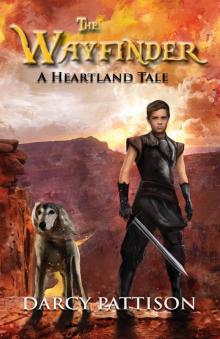 The Wayfinder
The Wayfinder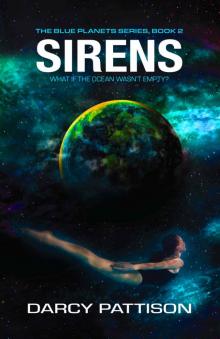 Sirens
Sirens The Girl, the Gypsy & the Gargoyle
The Girl, the Gypsy & the Gargoyle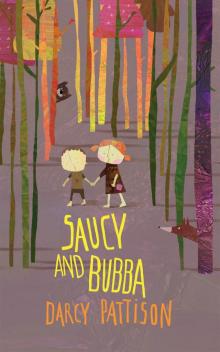 Saucy and Bubba
Saucy and Bubba Longing for Normal
Longing for Normal Kell, the Alien
Kell, the Alien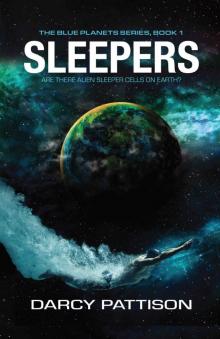 Sleepers
Sleepers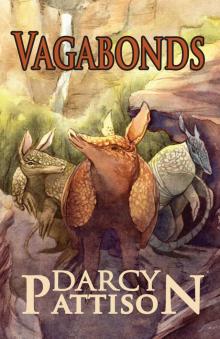 Vagabonds
Vagabonds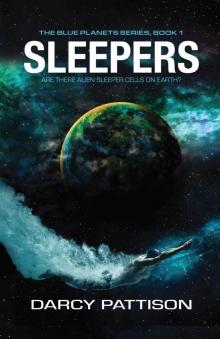 Sleepers (The Blue Planets World series Book 1)
Sleepers (The Blue Planets World series Book 1)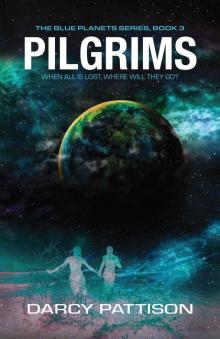 Pilgrims (The Blue Planets World series Book 3)
Pilgrims (The Blue Planets World series Book 3)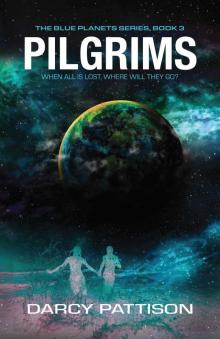 Pilgrims
Pilgrims Kell and the Horse Apple Parade
Kell and the Horse Apple Parade Sirens (The Blue Planets World series Book 2)
Sirens (The Blue Planets World series Book 2)